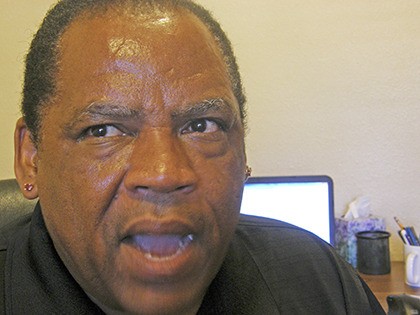When Auburn Youth Resources new development director sticks out a big paw and introduces himself, eyeballs bug out, and heads within earshot snap around, threatening whiplash.
“I’m Michael Jackson,” he says.
Of course, as those extruded eyeballs realize right away, this guy is not that Michael Jackson. And thank heaven. That’d be, umm, like, super Steven King creepy.
Ah, but wasn’t there once a famous, home-grown Michael Jackson on the loose in these parts? You know, played linebacker for the Washington Huskies? Of course, of course, in the late ’70s and ’80s played for the Seattle Seahawks, right?
Why yes, there was, and AYR’s new guy is he.
Today, Jackson is all about his new gig, which is raising funds so AYR can keep doing the good stuff it does.
“Right now, I’m just getting my head around the organization,” Jackson said, “it’s a lot bigger than I thought it was. All the different programs, I’m trying to get an understanding, so that I can then go out and sell that program to the community to tell them. See, right now I don’t know what they do.”
To tell the story of how this MJ came to be in Auburn, it is necessary to spill a little ink writing about his football career.
Born in Pasco in 1957, Jackson crossed the Cascades in 1975 to play for Don James in James’ first year as head coach of the Huskies. Although he’d been recruited as a running back and defensive back, Jackson said, he was moved in summer camp to defensive back and to a fifth-string, and “terribly unhappy” safety, who got no field time.
But that season, as linebacker after linebacker fell to injuries, James kept asking Jackson if wanted to play linebacker. No, Jackson said. If you don’t play linebacker, James finally told him, you won’t play at all.
So Jackson, “a skinny little kid, 205 pounds” as he describes his 18-year-old self, gave it a shot.
In his first game, against the University Texas and big, bad Earl Campbell, Jackson not only played middle linebacker, he was responsible for relaying calls from the sidelines to the field. And to his own great surprise, he was a natural. In the game, a loss, he made nine tackles, and that made a lasting impression on the coaching staff.
“I had a lust for the game and a drive to be where the ball was,” Jackson said.
“The interesting thing was, I was an undersized linebacker; the guys on the other line were a lot bigger than I was, but I was faster. I left the University of Washington with all the tackling records, and they’re still intact. I had 578 total tackles for a year, 219 in one season, 29 in two games, and the most solo tackles, 20, twice in a game. Just a little bit of bragging,” Jackson said with a chuckle.
In 1979, the 3-year-old Seattle Seahawks drafted him in the third round. He became a key player for coach Jack Patera and later Chuck Knox in the era of Jim Zorn, Steve Largent and Dave Brown, Dave Kreig and Sherman Smith, setting records along the way.
When his pro football career ended after the 1986 season — he took away more injuries than he can count, and has since had two knee replacements — the Kirkland resident became a part of Seattle’s corporate world, he said, going to work every day — and hating it.
Seven years ago, increasingly restless in the reins, Jackson struck out in a different direction, hiring on with a non-profit, and finding, he said, “the most satisfaction I’d felt since football.”
Yet, over time, the old unhappiness returned.
“I’d been noticing that my life had changed quite a bit, and I was thinking about what my life has meant to me and the world at large. And over the past seven years, it wasn’t very much, and I think I reached a point where I needed my life to mean something,” Jackson said.
Fortunately, Jackson recalled, a friend told him that AYR was, at that very moment, scouting for a development director.
“I applied, and I think we kind of fell in love with each other,” Jackson said. “I didn’t grow up rich, and my kids didn’t grow up rich, but they grew up having an opportunity to do what they wanted to do in life. I think that the mission position of AYR matches with my mission in life: I want to see people do well. If you have the goal to do well, I think you should be given every opportunity to achieve that goal.
“Catch ’em young, if you can, And if not, I don’t think we ever give up on anybody. At AYR, we work with people from birth to 25. If you catch them at 25, great,” Jackson said.



